Lest we forget: D-Day. June 6, 1944

This story was written a few years ago. I share it every year on June 6.
France will never forget.
– FGIS.
On June 6, 1944, American, British and Canadian troops landed on the beaches of Normandy. The liberation of France and Western Europe had started, leading to the defeat of Nazi Germany a few months later. We have all heard the stories of heroism, bravery and sacrifice; seen the photos; heard the staggering numbers of military and civilian casualties. Some of us have visited the museums, cemeteries and famous Normandy beaches.D-Day. Operation Overlord. Or, to the French le Débarquement. This was admittedly the largest air, land and sea operation undertaken in the history of warfare.
It all happened 68 years ago. A lifetime ago. But the people who lived through – and survived – these dramatic times, remember the war like it was yesterday. They have not forgotten. And they do not want others to forget, either.
So today, to celebrate the anniversary of D-Day and the liberation of my homeland; to honor the brave men and women who fought and sacrificed so much – and the civilians who endured, I would like to translate for you a personal letter.
Like many boys his age, my 12-year old son is fascinated with military history. In a few weeks, he will be lucky enough to learn more about trench warfare during World War I when he visits Verdun, in Northern France, with his cousin and my parents. Junior recently asked his grandmother, Mutti, to tell him about World War II, and her life as a young French girl during the German Occupation. This is what she wrote to him. They have both agreed to let me publish a free translation here.
Here is Mutti’s story…
“Yes, Alec, I am happy to answer your questions on WWII. It’s a good thing to be curious (…) I was six years old when war was declared at the beginning of August 1939, and I was 12 when Allied forces (United States, United Kingdom, Canada, Russia, and France,) signed the Armistice that put an end to war in Europe on May 8, 1945. You understand why I still remember a lot about those years.
I lived with my parents and my sister Micheline at the time, on the 4th floor of a Parisian building. After the outbreak of the war, Germany beat the French army pretty quickly. The Germans invaded France and entered Paris in June 1940. They called it “The phony war.” It was horrible for us to see the enemy in our homeland, taking over the most beautiful Parisian buildings and most elegant hotels for their generals, senior officers and their staff. They paraded on the Champs-Elysées. We were heartbroken.
 |
| German troops on the Champs-Elysées |
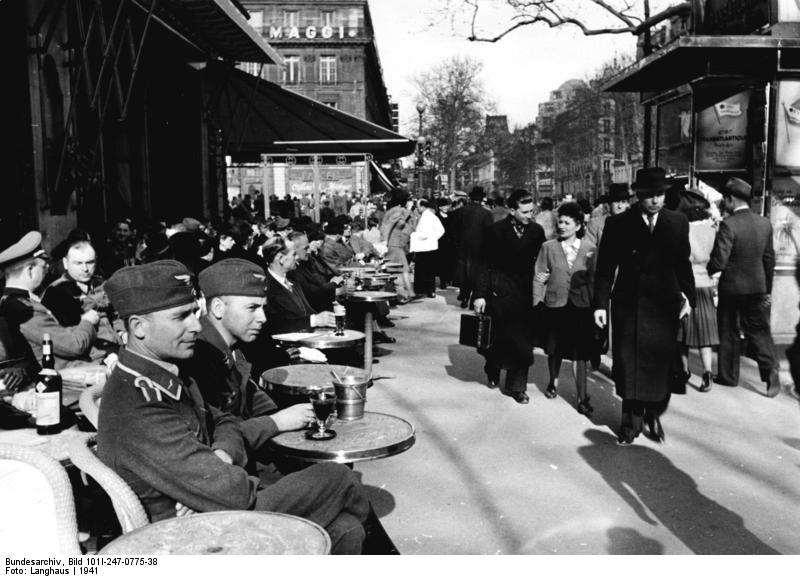 |
| German officers in Paris |
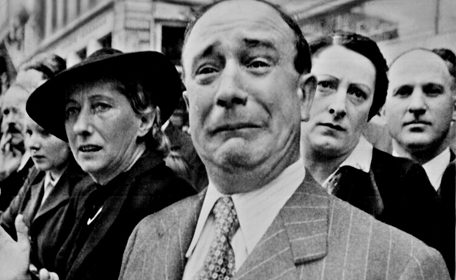 |
| French civilian, Marseille, September 1940 |
Then the Germans bombed strategic targets all over France, factories, railroads, towns and villages to crush our country, leaving behind human casualties, chaos, and ruins.
The German army captured tens of thousands of French soldiers, who were sent to camps in Germany where those who survived stayed for four, sometimes five years, until they were liberated by the Allied forces en 1945, as they were slowly dying of cold and starvation. My father, your great-grand-father, was one of them. He was lucky to be able to escape.
 |
| French prisoners, on their way to five years of captivity |
We, civilians, lived in France during those years, controlled by the Germans who took away all our supplies to feed their troops, or sent them to Germany, while we hardly had anything left to keep warm or to eat.
Winters were the hardest time for us. They were particularly cold during the war years. We were freezing everywhere we went, at home, at school, in church. The only place where we could keep warm was the Métro. I still cringe when I think about those winters. There was hardly any power left: We did our homework by candlelight!
We used rationing books to purchase food: After a while, there was no meat, no butter, no eggs, no potatoes, no fruit or vegetables. We would eat rutabagas (turnips) – yuck! – but my parents did their best so my sister and I had enough to eat.
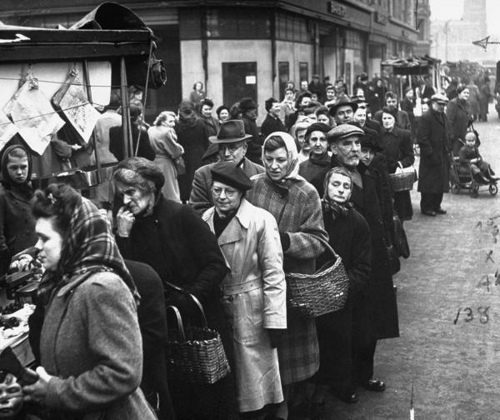
Then came air raids, when Allied airplanes fighting enemy troops flew over France on their way to Germany. I can still hear the sirens, in waves, resounding in the middle of the night. We did not know where the bombs would fall next. On our house? We were told to run for cover, usually in the basement, even in the dark. We were not afraid, and my sister and I used to giggle silently.
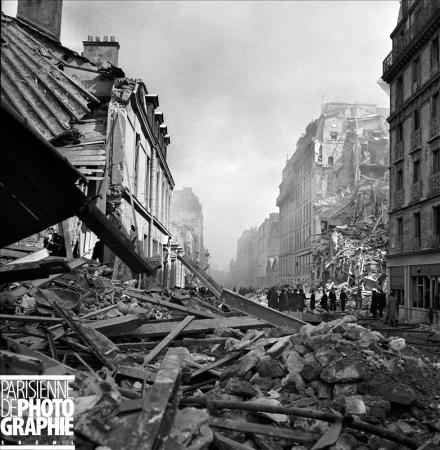 |
| Rue Championnet, Paris, 18th arrondissement |
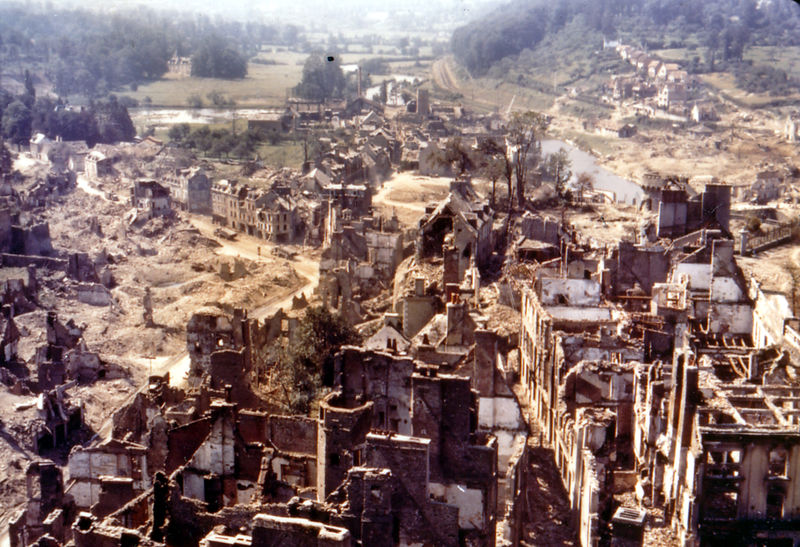 |
| St-Lô, Battle of Normandy, 1944 “Capital of Ruins” |
We wore special gas masks, meant to protect us from potential deadly gas like the ones used during WW1. We never actually used them, but we had to carry them with us everywhere, even as we dragged around our heavy school bags on the way to school. They were cumbersome and annoying.
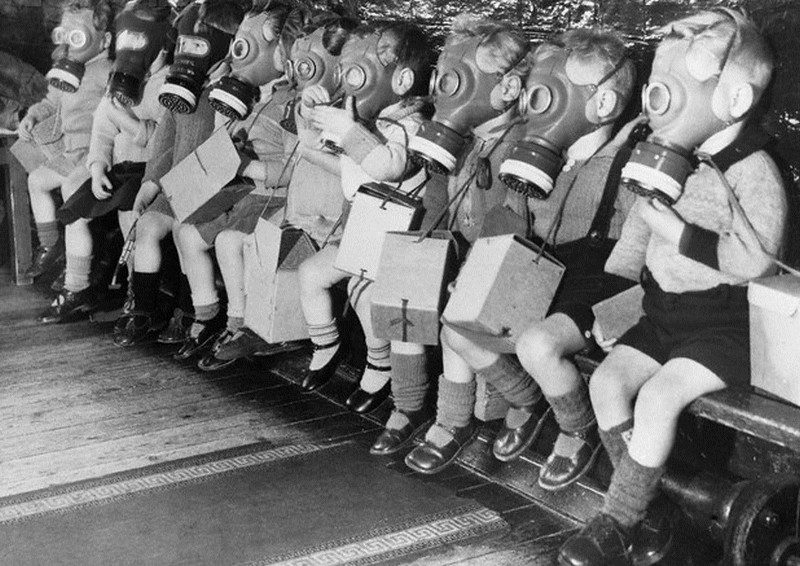 |
| School children “practicing” |
Meanwhile, General de Gaulle was in London with our English friends and our great American friends, and they were planning le Débarquement (D-Day.)
We all had high hopes that this would put an end to the German occupation.
 |
| General de Gaulle, reviewing the Free French Forces, London, 1942 |
Ah, unparalleled joy when on June 6, 1944, we heard that the Americans and Allied forces had landed in Normandy. You visited the region with your father and you understand what an incredible feat they accomplished that day. Thank you, thank you, thank you to all of them!
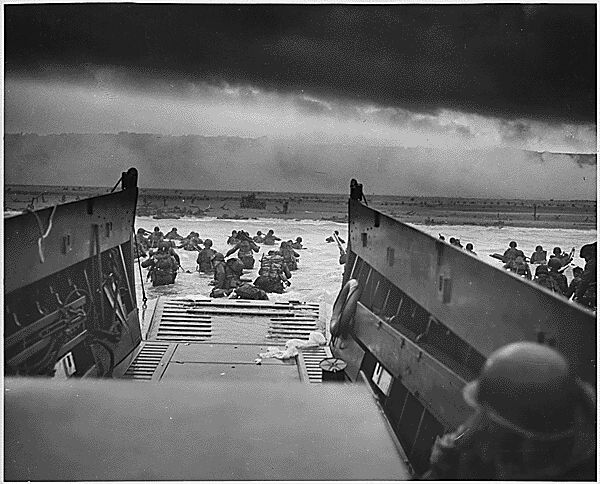 |
| (from the US Coast Guard collection in the US National Archives) |
 |
| Liberation of Cherbourg, June 1944 (Robert Capa) |
Then, as you know, the war went on, with several highlights: the Russians’ victory, Hitler’s suicide, the fall of Berlin, and finally, Japan’s surrender after the terrible events in Hiroshima and Nagasaki.
The world had been torn to pieces. It had to be rebuilt.
The Armistice put an end to that abominable war. It was signed on May 8, 1945. My family and I got to watch the most incredible military parade of victorious troops on the Champs Elysées on July 14, 1945. I was 12 then, like you today.
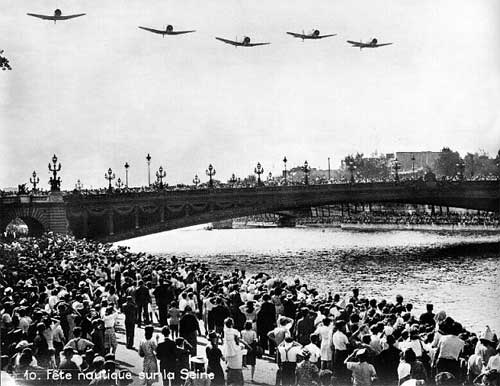 |
| Liberation celebrations (Paris, summer 1945) |
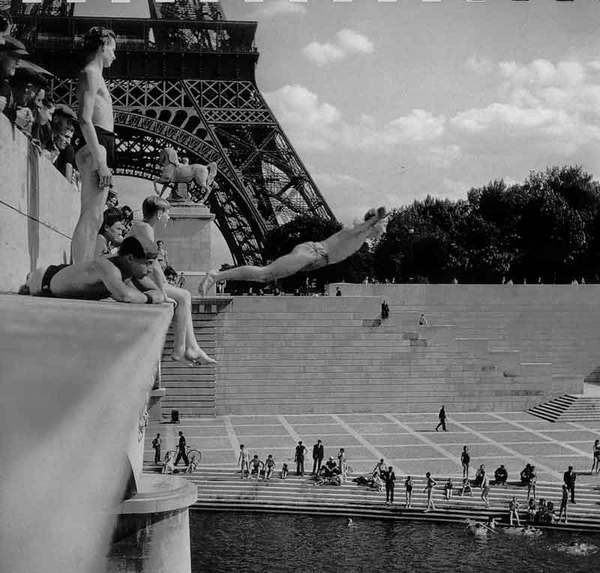 |
| Paris, Ponts d’Iena, summer 1945 (Robert Doisneau) |
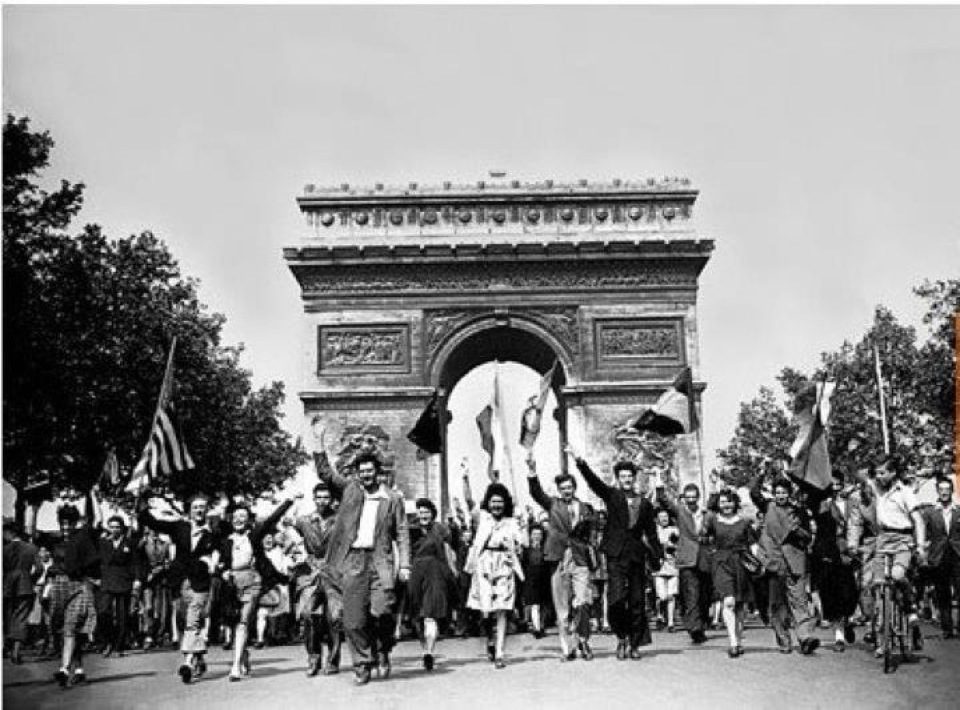 |
| Parisians celebrating on the Champs-Elysées, July 14, 1945 |
Here you are, my little Alec, a few memories – still so vivid – of those sad times. I can’t wait to tell you more when you visit Paris this summer.
– Gros bisous,
Mamie Mutti.
A bientôt.
D-Day, a tribute. Photos by Savoye Images
Do not use without permission.
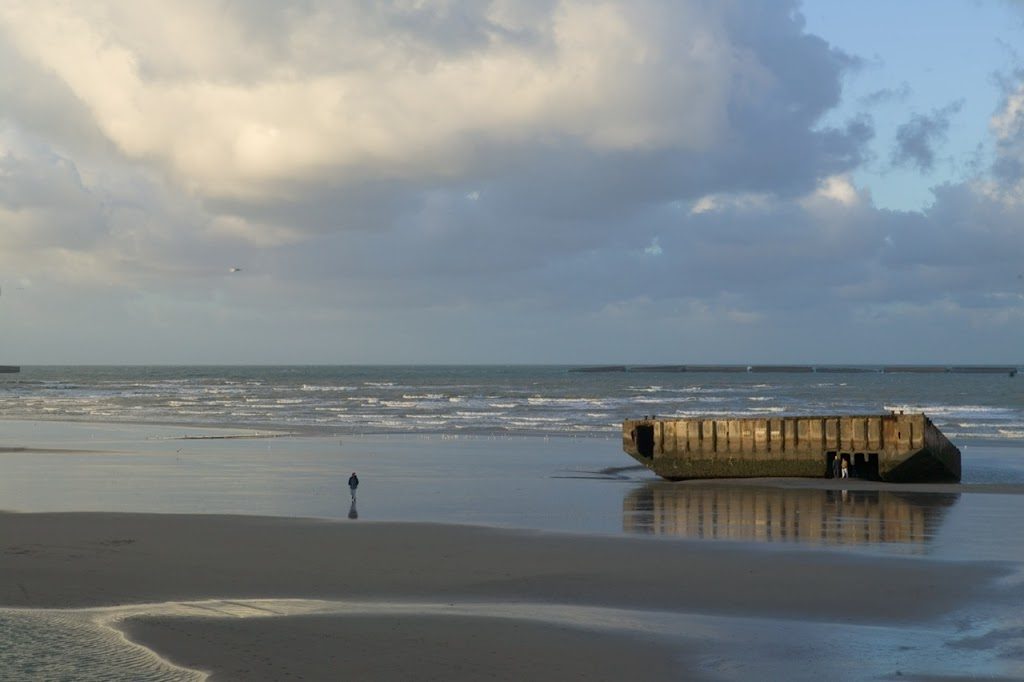 |
| Remnants of the temporary floating harbor, Arromanches, Normandy |
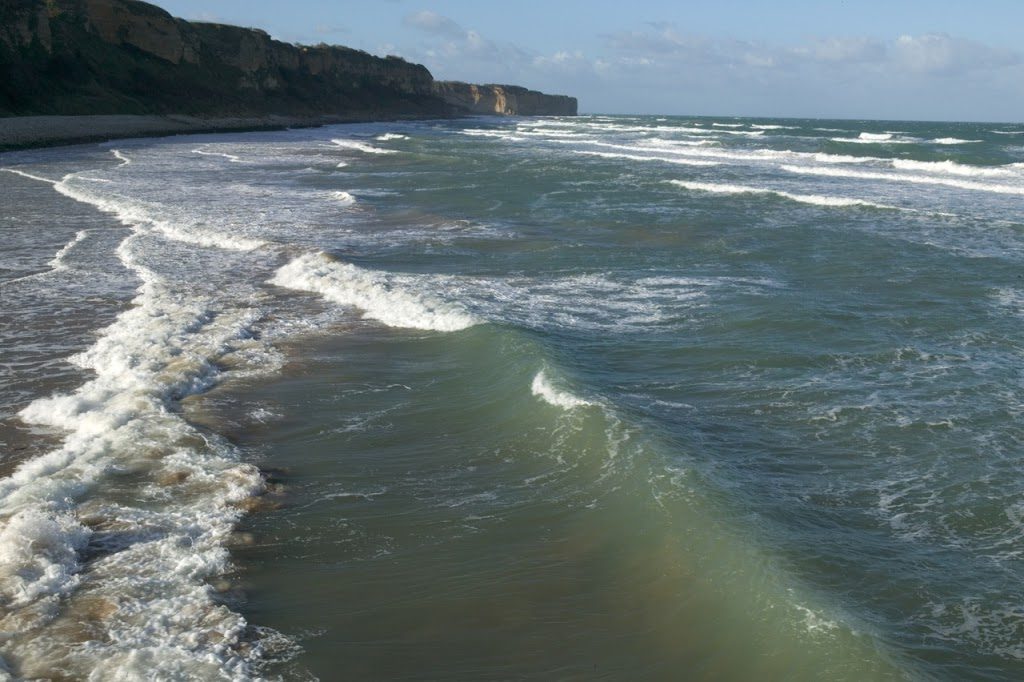 |
| Tall cliffs and a restless sea… |
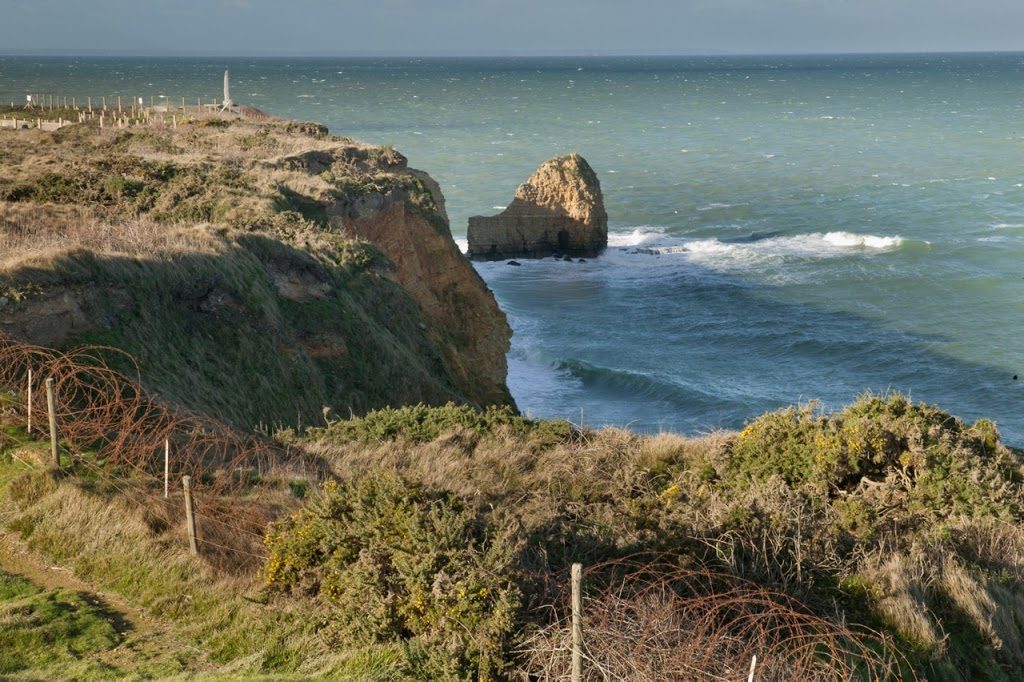 |
| The “Pointe du Hoc:” It did not resist the US 2nd Ranger Battalion’s two-day assault |
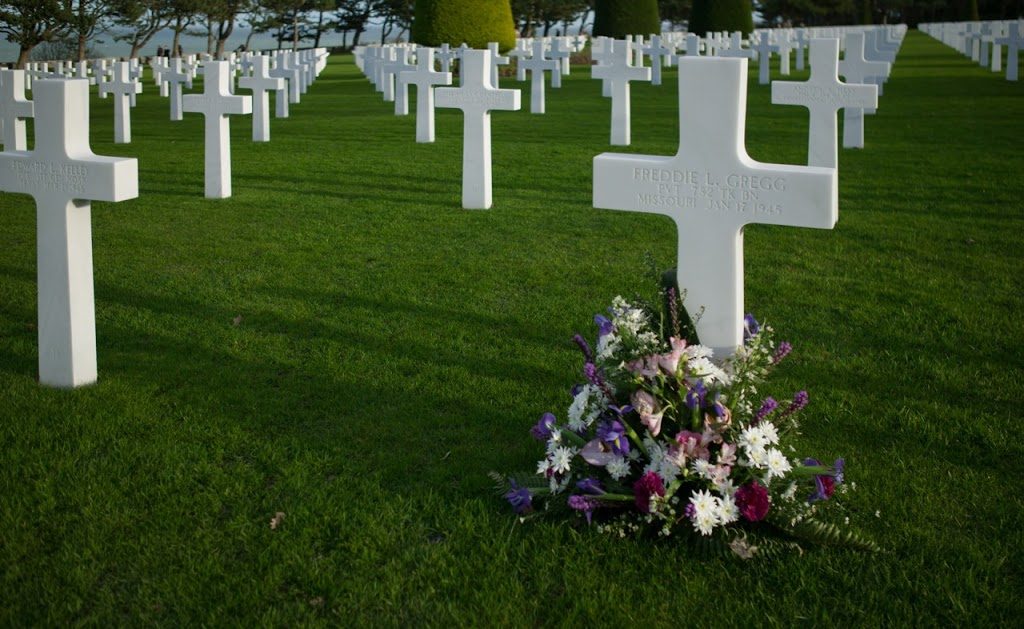 |
| American Cemetery, Colleville-sur-Mer |
06.06.12 update.
To my readers: Read more about D-Day here.
Excellent post by “Je parle Americain.”

Or click a link below to read the next (or previous) post...allons-y !
72 Comments
Leave a Comment
Join la Mailing List
Be the first to read stories and travel tips I don’t share anywhere else!
No spam, ever. That’s a promise. Visit the Privacy Policy.
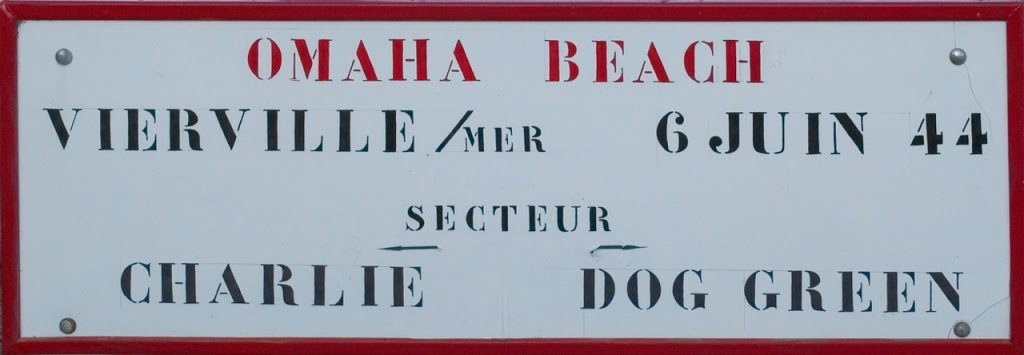


Chris and I visited for the 60th anniversary of D-Day and honestly it was one of the most moving trips we have taken. We took a boat from Portsmouth to Ouistreham filled with veterans in full uniform. It is the trip that I fell in love with Normandy.Thanks for sharing all of this- what a great post.
Thank you for your comment, Kim. I was in France that year, and I remember a very moving scene at Roissy Charles de Gaulle airport. Mutti (yes, the same lady!) walked up to a group of American veterans who had just sat down and were waiting for their flights. Some looked really old and frail, but they wore their decorations proudly. She walked up to them, and just shook their hands, one by one, saying: “merci, merci…” No other words were needed, right?
This is very moving, but needs to be told and remembered. My mother recently went into a local primary school to speak about her memories of living through the blitz in London and about ein an evacuee. Xxx
Toute une époque que nous n’avons pas connue. Merci, Véronique, de nous l’avoir remémorée!
I am sure the school children loved her stories. People suffered so much in London (the bombings were much worse than in Paris,) and they showed real backbone. I saw a lot of photos taken in England during the war as I was browsing the web looking for some illustrations for this story.
Merci de ta visite Richard.
Geeze! War is so devastating. Thanks for sharing this post. Presidents should always look back at history before going into war. The images you shared are amazing. Thanks french girl… a bientot. xo
Merci Sandy. I have a silly personal theory according to which presidents should fight among themselves in a contained area when they are even remotely inclined to go to war. No other casualties would be necessary. Isn’t that a brilliant idea? This would definitely help ensure that every presidential candidate runs for the right reasons, don’t you think? 🙂
v -i agree 100% with your “little theory”-
Thank you for sharing this incredibly moving letter. It is so important that we do not forget!
That was the least I could do, and I am glad Junior and Mutti let me share it with my readers.
Thank you so much for sharing your family’s personal story, Veronique. I too found it very, very moving. It wasn’t that long ago and yet we tend to think of WWII as ancient history. We must never, ever forget.
Thank you for stopping by Heather. One thing I miss about living in France is that, as you know, history is everywhere in my homeland. From street names to daily references in the press; in ads and commercials; one is surrounded with it and – I suppose – can’t ignore it. It is so important to know history in order to avoid repeating the mistakes of the past!
Thank you so much for this very moving post. We must remember the sacrifices made for our freedom today.
Absolutely, Liene. Merci de ta visite!
I very much liked this post. I’m an American living in Paris with my French husband, and a few weeks ago I encountered some of those quintessential “Ugly American Tourists” on a cross-town bus, who were complaining about (among other things) their false perception that the French neither remember nor are grateful for America’s aide during WWII. Of course WE know this to be untrue, and your post just shows this so beautifully. Hope you don’t mind that I linked to it in a post I wrote today about the upcoming D-Day anniversary. You can read that post here: http://theboldsoul.lisataylorhuff.com/the_bold_soul/2012/06/they_havent_forgotten.html
Thanks for sharing this with us. I’m sure your son got a lot out of his grandmother’s recollections.
By the way, do you know this blog (http://seattlemoxie.blogspot.fr/) – she’s an American who recently moved back to Seattle after living for a few years in Paris. I think she’s happy to have moved back but she does miss Paris too.
It’s wonderful to meet you Lisa. I am glad you found me today. I started “following” your blog, and I know I will enjoy it tremendously. Thank you for mentioning this story in your latest post, too. PS: I do know MJ and started reading her blog while she still lived in Paris. She is very funny!
HI Veronique. This is a very special story and definitely needs to be remembered, It is all true, I can say as we have been there. My husband is the same age as your mother and I am a few years younger. He knows a lot more than me because he was older. He did live in Amsterdam and his father had a business in what they called the Jewish neighborhood. They had a lot of friends there and they all were transported to camps in Germany. They never came back. It must at least have been 30.000 0f them, only in Amsterdam. Some people and families tried to hide like Anne Frank, some made it and some didn’t make it through the war. In that last winter there was no food or anything left. His sister went on an old bike for hours to see if there were any farmers in the country who wanted to give them some food. Terrible memories. All over Europe there must have been lost more than 3 million Jews. Sad story, right?. I was the lucky one in my family as I could stay with an aunt and uncle who had a little place where they grew vegetables and potatoes. My parents and brother were somewhere else and had to eat tulip bulbs and sugarbeets to keep alive. Terrible times but we survived.
Ok Veronique this was my little story for D Day, hope you don’t mind.
Have a nice day.
Riet
Dear Riet. You are telling a moving story of your own and it deserves to be featured more prominently, maybe on your blog this week? So many people have no idea how bad things really got during the war years for civilians all over Europe! No wonder people in our grand-parents’ and even our parents’ generation do not like to waste food. How could they after experiencing such deprivation? I don’t think you ever forget what it feels like to be truly hungry. How spoiled we all are, today. Thank you for stopping by, my friend.
What a wonderful experience for your son and his grandmère, a bond between them that he will never forget. Thank you for sharing this private story touching all who read it. On my recent trip to Paris, my husband asked about going to Normandy (both of our fathers fought in France/Germany and survived the war). I regret that we had not planned to make a trip to Normandy, but it is on our list.I am also touched by Riet’s comments and will email her. Those who lived in Europe through the war suffered in ways we cannot even imagine.As the signs all over Paris state: “Pardonnez mais n’oubliez jamais”Thank you, Veronique.Bises,Genie
Bonjour Genie. A very thoughtful message, thank you. Yes, there was much suffering involved, and it still amaze me how well the French and the Germans get along today, after all that fighting (they were at it on several occasions, as you know.) This makes you think; What was the point? (Hitler can’t be blamed for earlier conflicts, like WWI for example…)
Mutti says it very well…it’s good for all to remember and pass on to a younger generation.
Amen.
Veronique – thanks for your visit today! June 6 is definitely an important day to remember, and you’ve highlighted it wonderfully here. Thanks for sharing this with all of us!
You’re welcome. Thank you for stopping by Katelyn.
ah v i knew this would be a tearful read and indeed it was…for so many reasons…the trauma of war on everyone, for the loss of our boys ( girls too) lives, no matter the side, for the citizens of the country being terrorized and for the devastation of it all -mind body spirit soul ….i can feel mutti through your translation -i cannot imagine her horror and admire her honestry about the silent giggles shared between her and her sister…children so innocent-yet recalling these feeligs like it was yesterday….i love this post by far for calling to mind these events nand the lessons learned- hopefully NEVER to be repeated….and funny enough in the fall my sister and i are planning our vacation to this area in france-a long overdue visit….as i have never been….A HUGE HEARFELT THANK YOU for allowing us to share in your family”s personal experience-i really am so very touched ton amie g
Welcome back, my dear friend, g. I have missed you. I know you have had your share of heartbreak lately. This post was not the most cheerful one, was it? Still, the story had to be told. I am excited for you and your sister about the trip to Normandy. You will love it there. It is truly one of France’s most scenic areas. Of course, it looked very different back then, in war-torn France. Parts of Normandy got literally razed after D-Day. There were so many civilian casualties there. I know you will love your visit and can’t wait to hear about it.
Dearest Véronique,
What a precious personal letter to your son from his French Grandmère. That will make him ‘feel’ history a lot better than his classmates that have no living connection from that horrible past. Thank goodness that is over with, even though we’re almost at the verge of losing lots of our FREEDOM again if we’re not paying attention. Bit by bit it is already being taken away from us. Especially the young generation is living inside their own ‘bubble’ and not even gasping the true meaning of FREEDOM and the high price for it. My husband Pieter did write a similar story as your Mom did and I’ve published it on my blog: http://www.bit.ly/KTBS8m
Wishing you a lovely week ahead.
Love,
Mariette
Bonjour Mariette. Second message from a Dutch reader today! 🙂 One thing is for sure, my son is being raised with a sound knowledge of world history (that is the European way, after all…) I find that so many people know so little about what has happened in the rest of the world. I am determined he will not be one of them. Thanks to his grand-mere, he got one step closer to understanding what war really means to civilians (children!) who have to live through it.
Veronique, thank you so much for the reminder of this important day. We have so much to be thankful for in our lives today that wouldn’t be possible without the bravery and sacrifice of previous generations. It’s easy to take the peace we enjoy in our lives for granted and forget all the war and violence happening around the world. My prayers are for those who are facing the destruction of war today. Here’s to a future when all are at peace. XO
Bonjour Jeanne. That is a noble sentiment. May your prayers be heard. You are right. It is easy to feel content and comfortable while ignoring what is going on in other parts of the world. We are all guilty of it. That’s why it helps to be reminded once in a while about the true meaning of war, as Mutti did for her grandson in her message.
I’ve often wondered if there was any resentment toward the US for not entering the war until after the attack on Pearl Harbor. Had that not taken place would we still have watched from the sidelines? That being said, better late than never.
I honestly do not know, but that is certainly a valid question. I would surmise that European populations were too busy trying to survive. I may be wrong. Better late than never indeed. Without D-Day, who knows where we would all be today; or what language we would speak?
Thank you so much for sharing Mutti’s first-hand account of the Occupation. I have visited Normandie several times; it is always a moving experience to stand on the beaches and to consider the sacrifices made there.
Ironically, the Doisneau photo you feature in this post is called, “Le Plongeur du Pont d’Iéna”. Napoléon named the bridge after the 1806 battle of Iéna (Jena in Central Germany) in which invading French soldiers killed or wounded an estimated 10,000 Prussians (Germans).
Largely due to the leadership of Général de Gaulle following WW II, the centuries-old French-German cycle of invasion and destruction of each other’s countries came to an end. Europe and the world owe a lot to Général de Gaulle. He was a great man.
Bonjour Dean. Thank you for joining my “most faithful readers.” 🙂 What a wonderful comment. Great information about the Pont d’Iena and Doisneau’s shot. I am sure everyone will appreciate, as I have. As for your take on General de Gaulle, my dad would approve. He only refers to De Gaulle as “Le General” or “Le Grand Charles” (and I am pretty certain he does not only refer to his size!)
Bravo for this post … and especially a great bravo to Mamie Mutti!
Merci Peter. I will pass it on!
I agree, Bravo! This post was very interesting to read. It will stick in my head for many days to come. Thank you for sharing. Steve
You’re welcome Steve, and if this post does, indeed, stick in your head for a few days in the midst of your busy life, then I will be able to say: “Mission Accomplished” 🙂
Yes, bravo indeed! You share the most amazing posts, Veronique. What a wonderful letter that Mutil sent to Alec. This is letter is a treasure that he should keep always. We all need to remember these horrific years and the sacrifices that were made. My husband and I took a special tour in 1999. A professor at the University of Texas, a expert on D Day, let our group. We started in London, crossed by ferry into Normandy, and ended in Germany where the Armistice was signed. The trip took us from the planning to the invasion to the surrender. It was an amazing experience that I’ll never forget. So many emotional as we followed the path of these heros. Thank you for sharing this personal account that your sweet mother shared with Alec.
You’re welcome Sarah. I guess I did not make it clear enough that Mutti is my husband’s Mom 🙂 Still, it makes no difference, and I am happy that this story brought about so many insightful comments, and to some people, so many memories. Thank you for stopping by.
France shall always remember the sacrifice of her allies, not only Americans, but also British and Russian.It shames me that no American president has ever honored the french contribution in WWI by visiting places like Notre Dame de Lorette,the Marais de St. Gond, the Chemin des Dames, la Ferme de Navarin,Verdun, la trouee de Charmes, or Hartmannsvillerkopf.Even German leaders have!Remember this also: the french who collaborated with the Nazis were what we would recognize as the “Moral Majority” or “Neo-Cons”. In other words what we call the Republican Party.
Oh, a political comment. We are not used to these on this blog (not to say that we don’t enjoy them 🙂 I will not comment on the last part, but will say that I do not think there is a single French person who is not grateful to ALL of France’s allies during WW2. I remember that after studying WW1 and WW2 in detail as a high school student in the French Republican school system, I felt very grateful – and proud – of all French soldiers and their involvement in both conflicts. The soldiers Mutti mentioned in this story were not cowards and fought valiantly during the first few weeks of war. Many lost their lives. Their leadership and the French government at time are to blame for what happened next (France’s surrender.) France actually betrayed her own sons. I am particularly proud of all the young – and not so young – French people who left France during the Occupation and joined General de Gaulle in London, at the risk of being arrested, imprisoned, or worse, often leaving their relatives behind. De Gaulle himself could have been court martialed had he been caught. As a final note, I have overtime developed the theory that if a minority of French people did really bad things (we called them collaborators,) and another minority risked their lives to join the Resistance or even hide people on the run, a vast majority did what – I am surmising – most of us would do today: They tried to survive and feed their families during these grim times. There, my two cents. Getting off my soap box now.
Thanks for sharing the letter and pictures of Normandy. I am fascinated by what life was like during the war and German occupation. I always ask my aunts and uncles how it was and can’t believe what they tell me. I just found out they sheltered a Jewish family on their farm for almost two years in the Tarn.
Bonjour Michel. Well, perfect timing with this informative note (see my message above.) Your aunt and uncle were very brave people. I recently saw the Tarantino movie, “Inglourious Basterds.” I find the horrific opening scene (that takes place in a farm in the middle of France,) to be one of the best interpretations of what it must have been like, for the French, to live under the German occupation, and the daily choices many had to make. Food for thought. Everyone should watch it. Thank you for contributing today.
Merci for this reminder. My family visited to Normandy and some of its war sites in 1999. My son was 11 at the time and when we entered the American cemetery, all three of us were struck silent by the feeling of reverence. The grass looks like it’s cut with manicure scissors, and you have to be wearing shirt and shoes to be allowed in the Visitors Building to sign the guest book.
Here’s a pdf of the guidebook to the cemetery and its memorials. I particularly liked the Garden of the Missing.
http://www.dday0606.org/abmdoc-booklet-orig-enhanced.pdf
I also was powerfully impressed by the memorial at Pointe du Hoc, which memorializes it by keeping it just the same. You can’t picnic or camp there, and the grass is cut with weed whackers to follow the bomb craters. There’s a plaque inside the burned-out bunker commemorating the Rangers who climbed the steep cliff face and captured it, and a photo of cliff with a flag they spread out on it to signal the artillery that the objective had been taken.
It was a wonderful privilege to visit there.
Thank you for stopping by Ginny. I, too, remember the American Cemetery in Colleville sur Mer. Did you know that France donated this piece of land to the United States, and that it is maintained by American staff (this would explain the manicured lawn 🙂 — A very moving place. La Pointe du Hoc is a chilling location. One only needs to take a look down the cliff and imagine the 225 brave Rangers climbing it under heavy fire. Only about 80 survived I believe. True heroes (the term is attributed a bit too easily nowadays, don’t you think?)Come back soon!
Amazing post. Thank you so much for sharing this letter.
Véronique, I’ve updated my D-Day blogpost with a P.S. directing my readers here. It’s such a touching and personal perspective on the suffering of occupation and the joy of liberation that I want all my readers to read it. Thank you again for sharing this with us!
Merci beaucoup. I am glad I found your informative post this morning too. As I commented on your blog, particularly enjoyed the part about the role played by the French Resistance in the weeks that preceded D-Day.
Very moving. Have family members & friends (including French who are still alive) and have heard so many personal stories. Visited Normandy. My son too, who went to school in France, and American, and became French. France IS America’s oldest ally…and much of how Thomas Jefferson framed the US Constitution based on his (and George Washington, Ben Franklin’s admiration of France). France is the capital of the world in a sense as the most visited nation on earth. So much beauty there in every sense. So grateful she was saved. We must never forget.
Thank you for this beautiful piece.
Welcome back Suzanne. Thank you for your kind and appreciative words about my homeland. I am touched.
Wow … Thank you.
@LiberalinSC1 on Twitter
You’re welcome. Thank you for stopping by.
Dear Veronique, my hat off to you that you’re raising your son knowing about WWII and the highest price of Freedom. I do the same. Every year on 9 May that is the Day of Great Victory over the German Fascists for Russians we have a minute of silence and a candlelight and a talk. Listen to the Seventh Symphony by Shostakovich in besieged Leningrad. This is part of our heritage and my father who was 12 at the beginning of the war still remembers the names of his classmates who didn’t survive.
Your mom told a very touching story about hardships in occupied Paris and you put it together with amazing photo archive. D Day showed enormous courage and heroism.
Fallen shouldn’t be forgotten. Thank you Mutti very much.
I tried to tell my sons about the 900 days Siege of Leningrad where 1.5 million civilians out of 2.5 million people lost their lives from starvation, freezing cold and heavy bombarding. Hundreds of thousands of soldiers and navy fallen defending one of the most beautiful cities in the world nowadays St. Petersbourg, which Hitler aimed to erase totally. A horrible catastrophe.
The magnificent palaces in the city and around were restored from ruins to their unimaginable opulence. If you ever decide to see something more beautiful than even Versailles please e-mail me, I’d be happy to come up with some ideas.
Sorry for the long comment. Couldn’t help it.
Natalie
Dear Natalie, THANK YOU for the long comment! There was so much information that I don’t know where to start. I am glad you underlined what happened in Russia. Most comments here are about Europe, and everyone needs to know how much Russian people suffered during WW2. I would love to go to St Petersbourg one day, now more than ever, and if I ever decide to take the trip, I will make sure to ask you for advice. I am glad your son, like mine, will grow up knowing World History. Take care, my friend.
Just wanted to tell you I enjoyed reading your family story…today I spent the afternoon with a veteran of WW2 I recently met…we had a lovely time. I feel so grateful to be able to speak to him, ask him questions… he offered me the book he wrote about his war time… I’m going to start it and will ask him more details about the war and its ordeal…it’s so important to hear those precious testimonies…as they will be soon even more difficult to get…as the survivors of those times won’t be alive for too many more years!!! But WE have to make sure they are not forgotten and we still honor all they did for us.
Bonjour Christel. I understand why you enjoyed your special time with this WW2 veteran. What a wonderful idea he had to write about his experience. I am guessing this was helpful to him, cathartic almost.
What a wonderful post and so moving, Véronique. So much more poignant to read an account from someone who lived through this terrible time rather than learning from a history book. A few years ago we visited Arromanches and the cemeteries and I was astounded by the vast number or graves – as far as the eye could see.
PS Thank you for your lovely comment about the Jubilee celebrations.
http://missbbobochic.blogspot.co.uk/
Bonjour miss b. You are right, a testimony is always more valuable and poignant than a story in a History book. You relate to stories more when you know the people involved in it. I know Mutti’s words touched my son more deeply than any history book could have.
Brilliant post Veronique, thank you so much for sharing Mamie Mutti’s letter to your son. I despair every day about man’s need for warring and wonder if it’ll ever stop! The images that you’ve chosen to accompany your words are perfect, I’m in total awe of Robert Capa’s war images, and so tragic that it killed him in the end. Robert Doisneau also amazing at catching everyday life shots and making them special. My father was one of those soldiers that stormed the beaches at Normandy (Black Watch Regiment Scotland)thankfully he survived, but had nightmares right up until he passed away, as I’m sure many who fought in the war did. I pray everyday that our children won’t have to experience anything like this. I bet your son will treasure the letter forever, a possible heirloom perhaps. Take care, Grace.
Dear Grace. The journalists and photographers who cover world conflicts are at least as brave as the soldiers who fight them. Robert Capa was one of the greats. Your poor father. It does not surprise me that he had nightmares about D-Day for the rest of his life. I bet many of these brave men did. I am sorry he could not read Mutti’s words. I am thinking they would have made him feel good. Thank you for sharing these personal memories with us.
Sorry for the delay, but here also some historical facts that happened in 1943, starting in September, which helped in some way the success of Overlord.
Many brave men sacrificed himself to liberate Italy.
Many German divisions were mobilized on this front and has never been released to join the German forces in France.
To the east the Russians lost hundreds of thousands of troops to “occupy” the Germans on this second front.
The battle of Italy is less known, but it has permit to many French management, including those of North Africa, to participate (finally) the terrible fighting to defeat the Nazis.
The name of the French army was called “CEF” French Expeditionary Corps.
Engaged with allied forces to liberate Europe from Nazi dictatorship, the French Expeditionary Corps commanded by General “June” has landed at Naples (released in September by the U.S. Army General Clark) September 23, 1943 .
The front was stabilized on the Garigliano and Sangro rivers and the mountains of Abruzzo, where the Germans were entrenched behind the Gustav Line
On 16 December, the second Moroccan Infantry Division of General Dody takes his place on the forehead followed by other volunteer troops recruited in North Africa.
In the cold winter of heavy fighting taking place for the possession of Monte Cassino.
May 18, 1944, through the bold maneuver of General June in Aurunci Mountains, the lock jump, clearing the way for the capture of Rome (June 4, 194
The number of 15,000 in December 1943, 113,000 in May 1944, French troops have complained almost 10,000 killed or missing 23,506 wounded in few weeks.
The cemetery includes Venafro soldiers killed in fighting for the capture of the Gustav Line including those who died in hospital of Naples and Miano is previously buried 4,922 graves.
PASSING, THAT YOUR DREAM FREEDOM WAS PAID THEIR BLOOD! “
The number of divisions of the German mobilization in Italy, could never reach the north of France to repel the Allied forces.
If the allied forces were able to reach Berlin along the Russian army is certainly thanks to the German defeat in Italy.
French forces did participate in these terrible battles in Italy.
It was General Leclerc and his tank division who discovered “the eagle’s nest” refuge from Hitler in Austria.
But many French people, civilians, died in France evrywhere in the south of Normandy.
They harassed the SS divisions that were installed in the south west of France.
There have been numerous killings by the SS, excited to find the bridges destroyed, power poles lying on the roads, telephone lines sabotaged.
The most famous terrible massacre : 700 people in Oradour sur Glane.
Men, women, children and elderly. Only three survivors.
At Tulle, the SS 100 men chosen at random, and have hung on the balconies of the city.
This SS division arrived too late and could not reject the allied forces in the sea!
Mission accomplished for all those brave people who have joined forces to our friends of the American, British, Canadian, Polish, and also French fighting the Nazis.
Thanks to General de Gaulle in France, the French and Germans have become best friends.
Europe is mostly built for everything that has happened, never happens again.
I have many friends in Germany who are my age (48 years).
This generation is still traumatized by the “souvenir” that “parents” did wrong, or let them go.
Pray that this never happens again!
Georges (véro brother 🙂 ) a friend of all people 🙂
Little Brother– I see you are still the “history buff!” Great info here. Thank you for sharing, and in English, no less! It took me a while to realize that “General June” was actually “le Maréchal Juin,” but no matter. Great post! Bisous.
Yes, Meerci beaucoup! It was a world war indeed. It also involved Africa, and not just North Africa. I believe my late grandfather Charles Situma Songoro, a Kenyan, fought in the war of Abyssinia in North East Africa as part of the Kings African Rifles with the Allied forces & the Empire of Ethiopia against the Italians. Many of his colleagues from Kenya and Uganda also participated in related battles around the globe. They were drafted in a war whose beginnings, objectives and expanse they did not fully comprehend partly because “nobody” would mourn or remember them. They had to be brave soldiers; having learned Western, mechanized warfare fast enough to survive, they later changed histories of their countries. Long before internet reached our village, i recall that he always kept abreast of “world news & information” via BBC Radio on a static-plagued, hand-held, battery-powered device, a habit he must have picked during the War. He and others like him died with so much information about their role in these Wars. I believe there is a commemorative statue to these unsung heroes along Kenyatta Avenue in Nairobi for those of you who might visit Kenya(near crossroad with Wabera Street). Let us also not forget these.
Merci Beaucoup! French Girl in Seattle for starting & keeping track of these conversations! Thank you “Georges” for mentioning Africa. It was a World war indeed. East Africans from Kenya, Uganda and even Malawi also fought as part of the British King’s African Rifles in many related battles around the globe (notably the battles of Abyssinia). I fondly remember my grandpa Charles Situma Songoro telling us stories of crash courses in Western artillery & intelligence. They were drafted into Wars & allegiances whose origins, justification & objectives they knew little about, partly because “nobody” would miss, mourn or remember them. They had to be brave and sharp to survive; later they played a pivotal role in struggles against colonialism, changing histories of their countries. Long before internet reached rural Kenya, I have an enduring image of him keeping abreast of “world news & information” by religiously following radio bulletins on BBC using a static-ridden, battery-powered, hand-held (to the ear no less)device; a practice he must have piked up from the War. If any of you visit Kenya, please take a walk to the commemorative statue to these unsung heroes along Kenyatta Avenue in Nairobi (near crossroads with Wabera Street) or to the War Memorial Cemetery ( often manicured) along Uhuru Highway and the War Memorial hospital along Mbagathi Road respectively. N’oublions pas svp !
Thank you for this moving post. I just discovered your Blog today. As a “boomer” I was born after WWII, the child of a U.S. Air Force pilot who flew out of England and North Africa, then out of Italy. At the end, we were stationed in Japan, where I was born. Our parents made sure we remembered. We lost a grandfather at the end of WWI.
I lived in England in the 1990’s, and found a lot of reminders there. My second day, mixed in with the other News, was that a Charter had been issued to rebuild the last remaining bombed out church. I nearly cried. I probably felt rather like my mother did when we went back to Tokyo in the mid 1960’s and saw a city and healthy people where we had known mostly rubble and ruin surrounding the Imperial Palace. Those places help keep the past in thought.
I had the lovely experience in England of living with a group of dear older ladies who remembered the “Yanks.” “Memphis Belle” came out while I was there and it brought back a lot of memories for these ladies and I found them surrounding me and thanking me as an American.
No, they haven’t forgotten.
On behalf of my parents I thanked them for being the bulwark that stood nearly alone for so long until we could get it together and join them.
I think it’s the ones most likely to repeat the horrors that work so hard to deny history.
Thank you for this very personal and touching message, Dianne. I know my readers will enjoy reading one more testimony about the war years. Come back anytime! Thank you as well for joining the ranks of my “Faithful Followers.” Ours is a peaceful, supportive, usally good humored group. You will like it here!
Thank you, I shall, it’s a lovely blog. As a painter, I particularly enjoy the pictures that go with the your wonderful stories.
Thank you so much. It means so much to keep this history alive. My father was drafted into the US Army just when I was born. He landed in France late July ,1944. He died in the battle of St..Lo in August, 1944. I was only a few months old. He is buried in the Brittany Memorial Cemetery in St. James France. I visited his grave in 1966. I visited Normandy and the beaches 3 years ago. I’m now reading The Nightingale about the war in Frace and the resistance movement.
.My uncle have his life on D-Day on the beach at Pont du Hoc. He was just 19 years old. He is buried in the American Cemetery My family has visited his grave over the years and are always warmly received and thanked for his service by the French people.Our French friends and extended family in France are always close in our hearts <3
[…] has already shared stories and childhood memories with my readers. You may remember the moving letter she sent to her grandson about her experience as a young child during the German Occupation of […]